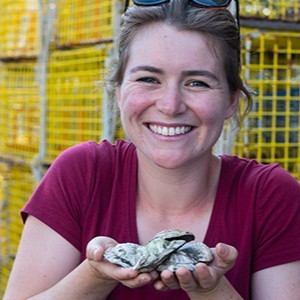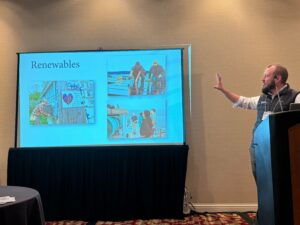
I had my first day at Island Institute on a Monday, and by Wednesday I was boarding a train to Rhode Island to attend the Northeast Aquaculture Conference and Exposition (NACE). The Amtrak was buzzing with excited chatter between industry acquittances, old friends, and colleagues, excited to connect in person and not at a virtual conference.
NACE is a biennial opportunity for producers, researchers, vendors, students, service providers, and nonprofits to share the latest updates on everything ranging from shrimp farming in Vermont to gender equity on the working waterfront. Much has changed in the 25 years since NACE was first held, and those who were present for at its inception were moved by the much larger, younger, and energized group that attended this January. What hasn’t changed since 1998 is a desire to sustainably feed our world and “nerd out” a bit in the process.
This year’s NACE kicked off with a plenary session that highlighted federal policy stating what us in this industry already know to be true: aquaculture is a tool to feed our 8 billion+ person planet. In the recent ‘National Security Memorandum (NSM-16)’, the White House stated that aquaculture is agriculture and therefore its protection is critically important for the security of our country. Similarly, in ‘Threats to Food and Agricultural Resources‘, the Department of Homeland Security pinned the growth of the aquaculture sector in the United States as a priority for supporting food resilience, and the ‘Ocean Climate Action Plan’ calls to expand and decarbonize aquaculture.
Adding gravity to this federal prioritization was the major storm and flooding event that devastated parts of Maine’s coast the day before the conference, and the equally destructive flooding event to come the day after the conference. Bookended by the realities of climate change, my attendance at NACE and my role at Island Institute felt strikingly pertinent.
To continue the conversation of the federal government’s role in the expansion of aquaculture, NOAA hosted a listening session. In the session, attendees shared suggestions and concerns, and NOAA set expectations based on different levels of potential funding. Many of the comments called for building social license to operate aquaculture, but it was not established as a major priority for NOAA. However, it was the focus of several sessions at the conference.
The sessions on building social license emphasized the need for effective community development, outreach, education, and participation. Prior to working for Island Institute, I was an oyster farmer in Casco Bay. After that, I managed a community-based seafood wholesaler on an island. Building social license was in everything I did, and it will continue to influence my work with business development and decarbonizing the working waterfront. Social license seemed to echo through every session and conversation at NACE, just as it will with my work at Island Institute.
At NACE, many sessions focused on improving aquaculture, instead of settling for “good enough”. A series of presentations titled ‘The Solar System’, included recipients of our Spark! Grants demonstrating the use of solar power on their farms. ‘Pathways to Plastic Free Aquaculture’ showed innovative plastic alternatives for oyster grow bags, nylon line, cages, buoys and more.

At Island Institute, the Center for Marine Economy works to improve the sustainability of the aquaculture industry, through marine electrification, solar installations, and greenhouse gas (GHG) emission studies. In 2022, we concluded a GHG study on Luke’s Lobster, and we are currently conducting a study on Bang’s Island Mussels and Atlantic Sea Farms. At the final session of NACE, our Center for Marine Economy Director Sam Belknap and Community Development Officer Sam Feldman presented preliminary findings of the mussel and kelp studies. The results of the GHG assessments will influence priorities for our center and help create a roadmap for a carbon friendly aquaculture industry for Maine.
Since its inception, NACE has showcased the evolving strength and innovation of the aquaculture industry. Looking ahead, the next 25 years hold immense promise for aquaculture and the associated resilience for Maine. NACE provided the momentum I needed for my new role at Island Institute, affirming the importance of the work ahead.

